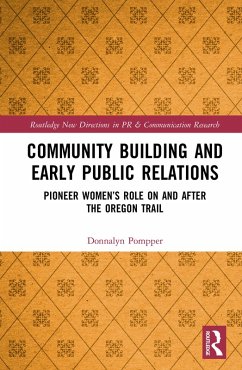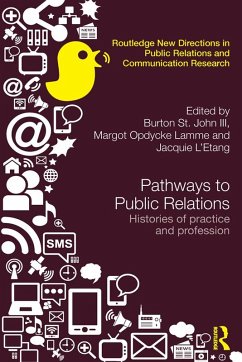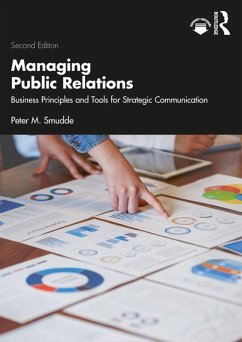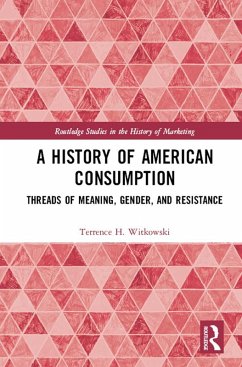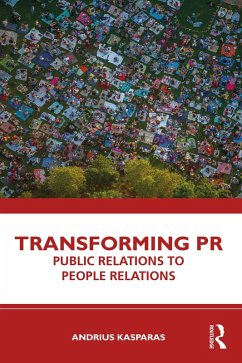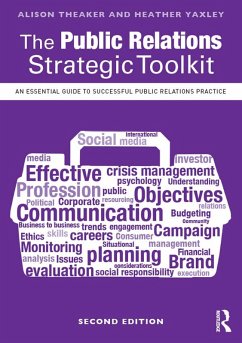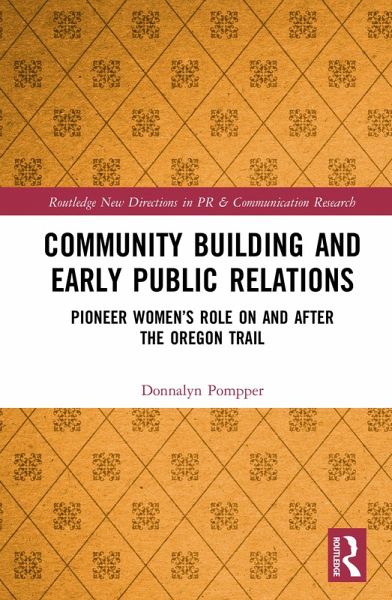
Community Building and Early Public Relations (eBook, PDF)
Pioneer Women's Role on and after the Oregon Trail
Versandkostenfrei!
Sofort per Download lieferbar
41,95 €
inkl. MwSt.
Weitere Ausgaben:

PAYBACK Punkte
21 °P sammeln!
From the start, women were central to a century of westward migration in the U.S. Community Building and Early Public Relations: Pioneer Women's Role on and after the Oregon Trail offers a path forward in broadening PR's Caucasian/White male-gendered history in the U.S. Undergirded by humanist, communitarian, critical race theory, social constructionist perspectives, and a feminist communicology lens, this book analyzes U.S. pioneer women's lived experiences, drawing parallels with PR's most basic functions - relationship-building, networking, community building, boundary spanning, and advocac...
From the start, women were central to a century of westward migration in the U.S. Community Building and Early Public Relations: Pioneer Women's Role on and after the Oregon Trail offers a path forward in broadening PR's Caucasian/White male-gendered history in the U.S. Undergirded by humanist, communitarian, critical race theory, social constructionist perspectives, and a feminist communicology lens, this book analyzes U.S. pioneer women's lived experiences, drawing parallels with PR's most basic functions - relationship-building, networking, community building, boundary spanning, and advocacy.
Using narrative analysis of diaries and reminiscences of women who travelled 2,000+ miles on the Oregon Trail in the mid-to-late 1800s, Pompper uncovers how these women filled roles of Caretaker/Advocate, Community Builder of Meeting Houses and Schools, served a Civilizing Function, offered Agency and Leadership, and provided Emotional Connection for Social Cohesion. Revealed also is an inevitable paradox as Caucasian/White pioneer women's interactional qualities made them complicit as colonizers, forever altering indigenous peoples' way of life.
This book will be of interest to undergraduate and graduate PR students, PR practitioners, and researchers of PR history and social identity intersectionalities. It encourages us to expand the definition of PR to include community building, and to revise linear timeline and evolutionary models to accommodate voices of women and people of color prior to the twentieth century.
Using narrative analysis of diaries and reminiscences of women who travelled 2,000+ miles on the Oregon Trail in the mid-to-late 1800s, Pompper uncovers how these women filled roles of Caretaker/Advocate, Community Builder of Meeting Houses and Schools, served a Civilizing Function, offered Agency and Leadership, and provided Emotional Connection for Social Cohesion. Revealed also is an inevitable paradox as Caucasian/White pioneer women's interactional qualities made them complicit as colonizers, forever altering indigenous peoples' way of life.
This book will be of interest to undergraduate and graduate PR students, PR practitioners, and researchers of PR history and social identity intersectionalities. It encourages us to expand the definition of PR to include community building, and to revise linear timeline and evolutionary models to accommodate voices of women and people of color prior to the twentieth century.
Dieser Download kann aus rechtlichen Gründen nur mit Rechnungsadresse in A, B, BG, CY, CZ, D, DK, EW, E, FIN, F, GR, HR, H, IRL, I, LT, L, LR, M, NL, PL, P, R, S, SLO, SK ausgeliefert werden.




